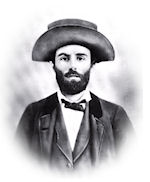New Year’s [1862]. Took dinner with Mrs. Norton. Miss Betty Callender and Doctor Richardson the only strangers present. Mrs. Chilton keeping us all alive. Dr. R. has some machine on hand with which he intends to blow up Federal rebels. It is highly approved by all who have seen it. In the evening, Edmund (or Edward) Harrison, whom they all call “Duck,” came in. He has lately returned from Europe; he was studying at Bonn, but our Southern troubles have brought him home. He is a quiet, modest young man; though his father is so rich, he is retiring in dress and deportment and seems to have no desire beyond a quiet room and a book. He does not represent the idea of “young America” in the least. He is in love, I think, with his pretty cousin, S. C, who is altogether unsuited to him, being fond of admiration and the world generally.
Lizzie Ogden, speaking of her brother Billy, now in the Confederate States Army as lieutenant, says, that as an officer, he has been let into the secret of Beauregard’s plans, which he, Billy, thinks excellent—said brother not being twenty. The mingled pride and simplicity of this speech made me laugh—in my sleeve—though I would not hurt Lizzie’s feelings for the world.
Everybody sending blankets to our soldiers. We have sent all of ours except two thin ones. Mrs. Chilton and I go to the Ladies’ Sewing Society and bring home bundles of work to do for the soldiers.
Free market kept up by contribution. Planters all over the county send in to support it. The poor, it seems, are quite fastidious; some scenes in the free market are quite ludicrous. Some of the women, if told they cannot gratify some particular taste, refuse all that is offered; for instance, one became angry a few days ago because presented with black tea instead of green, and another finding no coffee turned up her nose at all the other comfortable items which the market contains. Some women, they say, curse their benefactors heartily when disappointed. Coffee they had at first, but blockade times have changed this once familiar berry into something resembling gold beads. Cleopatra, with her pearls, was scarcely more “wastefully given” than a coffee drinker in these days. Strange to say, I have not relished it for years until now. I have not parted with my tea yet, though I dole it out somewhat less lavishly than in old times when tea caddies were as “plenty as blackberries,” rather more so in New Orleans.
Mrs. Chilton, going up to Hinds County, begs us to go with her, but there is something in our own little home which we cannot give up. We are so lonely-hearted, so wasted by early afflictions; anxious, nervous years and desolating losses, that we have nothing of feeling or interest to interchange with any, even those we approve.
Gave Mrs. Chilton a little supper the very night before she left. Mrs. Montgomery without the Judge (no gentlemen invited), Mrs. Norton, Mrs. Parham, Sarah C, Mary Lou Harrison and Mrs. Dameron were the guests. Mr. Dameron came, not knowing gentlemen were interdicted. Charley Chilton came in after awhile, and Mr. Parham sent word that it was very unkind to admit but one of the “Confederate Guards.” Amused Mrs. Montgomery and several others with a trick with a key and a book which told the fortune accurately of everyone present. If I had found the philosopher’s stone, it could not have given more general satisfaction, I believe. Wanted to keep Mrs. Chilton for a good-bye late talk, but Mrs. Norton hurried her off.



